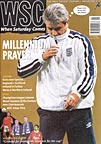 Troubles at Hull City and confusion at Hasting Town and St Leonards
Troubles at Hull City and confusion at Hasting Town and St Leonards
When clubs get rid of an unpopular owner, fans are naturally tempted to greet his successors with a relatively uncritical eye. Few at Hull City were sorry to see the back of David Lloyd and the new regime of chairman Nick Buchanan appears to have restored a measure of stability. However, there may still be trouble ahead.
The FA’s compliance officer Graham Bean has been investigating the role in the club of vice-president and major shareholder Stephen Hinchliffe, much to Buchanan’s disgust. “I want to stress that we have absolutely nothing to hide and the FA are wasting their time and money in what I can only describe as a persecution of this football club,” he said. “Why is Bean hounding us?”
Hinchliffe’s past suggests some possible reasons. In 1994 his Facia group of companies took over several well-known high street retailers such as Sock Shop, Freeman Hardy Willis and Salisburys. Two years later the enterprise collapsed with debts of more than £30 million under circumstances which led to fraud charges against Hinchliffe (which he denies). In November 1998 Hinchliffe was banned from being a director of any British company for seven years after being found guilty in the High Court of unfit conduct as a director of a separate company, Boxgrey.
Newspaper reports have suggested Bean’s interest centred on City’s purchase of a team bus from Hinchliffe for £75,000. However, Hinchliffe also drew attention to himself by “sharing his vision” for the future of the club in the programme earlier this season, potentially implying his role may extend beyond “advising on football matters” as Buchanan insists.
Hinchliffe’s name also crops up in the tangled affairs of Reg Brealey (see WSC 153). Hinchliffe was on the board at Sheffield United when Brealey was chairman. He also followed Brealey as a director of the company that owned the remote Knoydart peninsula in the Scottish highlands, where Brealey had bizarre plans to start a “back to basics boot camp” (it’s a long story, and frankly you wouldn’t believe most of it). Hinchliffe came under fire for neglecting the estate and the company subsequently went into liquidation. All of which may or may not be relevant to the future of Hull City, but goes some way towards explaining why not everyone is comfortable with Hinchliffe’s role at Boothferry Park.
The board of Notts County, incidentally, appear to have decided that they can do without the kind of investment Brealey offers for the time being, after his mooted involvement in the club was questioned by fans and the local press.
How much simpler things would be if clubs could be rescued by a succession of friendly local lottery winners. Or not, if the experience of Hastings Town and St Leonards is anything to go by. The two clubs, whose grounds are only a few hundred yards apart, meet in the Dr Martens League Eastern Division on December 27. But they were almost rolled into one earlier this year, thanks to the intervention of their very own friendly local lottery winner, Mark Gardiner.
He first put around £250,000 into St Leonards, then fell out with them and arrived at Hastings in 1997 with similar amounts of largesse. In November 1998, however, with the team near the top of the Premier Division, he suddenly put the whole squad up for sale, resigned the club from the league and declared he had lost interest in local football.
In the close season it turned out Gardiner was behind a bid from St Leonards to buy Hastings, by then in administration. His motives stemmed from the fact that he thought there should be only one club in the town – not illogical, but not a happy way to go about a merger either. Hastings escaped with a new management set-up and demotion from the Premier, despite finishing fifth. Last time the two clubs met there were 1,600 there. Stand by for some south coast holiday fun.
From WSC 155 January 2000. What was happening this month